




Panels play a crucial role in adoption, fostering and kinship care. The recommendations they make can have lifelong impacts on the lives of children, families and carers, and yet there is little guidance for panel members on how to be effective, focused and inclusive in this role.
This conference is a rare opportunity to focus on the work and role of panels and will bring together panel members, professionals and researchers to explore key challenges, best practice, and research on how panel members work together to reach collective recommendations.
Through discussions, knowledge sharing and collaboration, we will look at how panel members can recognise the power they have and be supported to use this effectively and inclusively.
We will consider what constitutes effective panel working and how individual members can come together to make inclusive, evidence-based recommendations
We will:
Consider the legislation, guidance and standards that underpin the work of fostering, kinship and adoption panel members.
Consider the tasks and responsibilities of panel members.
Think about how our own biases influence our recommendations and contributions to the work of panels
Explore how panel members’ personal experiences and beliefs influence their recommendations.
Develop confidence in how to be an effective panel member and contribute to collective discussions.
Our programme enables you to hear the perspectives of local authority leadership, leading research, experts with lived and learned experience, as well as the voices of children in care.
Our workshops can give you a better understanding of the National Minimum Standards in a kinship context, in listening to and writing about children, in Early Permanence matching, or a study in case law and permanency planning.
We are delighted to welcome you to today’s conference, and hope it provides you with the opportunity to network, learn from colleagues and improve your practice.
Written by Jane Poore, Adoption Consultant , CoramBAAF

9.30am Registration
Welcome
10am
10.10am
10.35am
Michelle Bell, Head of Member Services and Engagement, Interim Managing Director, CoramBAAF
Keynote address
Jenny Coles CBE, Panel Member, Child Safeguarding Practice Review Panel
Presentation
Keeping children central to the work of panels | Linda Briheim-Crookall, Head of Policy and Practice Development, CoramVoice
11am Break
Presentation
11.30am
11.55am
Harnessing personal judgement for effective impact: The Chair as a facilitator of panel curiosity | Dr Arlene P Weekes, Author, Anti-Black Racism Activist, Social Work Management Consultant and Trainer, PGCHE SFHEA.
Panel discussion
Chaired by Emma Fincham, Fostering Consultant, CoramBAAF
12.35pm Lunch time
1.35pm Workshops Round one
2.25pm Comfort break
2 40pm Workshops Round two
Final comments
3.30pm
Key takeaways from workshop leads
4pm Close
Panel Chairs (Adoption)
7 March 2025
9.30am - 12pm
Online via Zoom
Panel Advisers
(Adoption & Fostering)
Meeting dates for 2025-26 coming soon

CoramBAAF’s Panel Chairs (Adoption) and Panel Advisers (Adoption & Fostering) Practice Forums provide a unique opportunity to discuss professional practice and share knowledge and expertise with colleagues.
The forums will help you to keep up-to-date about national policy and law, contribute to policy development, and refer topics and examples of good practice to CoramBAAF’s advisory committees.
Networking and liaison with other panel workers
Information and advice – including training opportunities – relevant to panel workers
Access to briefing notes, position statements, reports, publications and research

We have been updating and revising a number of our core forms as well as developing a new one with partners. This has been a significant piece of work for us, and we are reaching the exciting point of being ready to share these updates and revisions with our members and forms licence holders throughout 2025
CoramBAAF publishes legally compliant health and social work report forms for adoption, fostering, kinship care and other care plans. These are widely used throughout the UK and are available to use under a licence agreement.
“Reviewing, revising, writing and piloting many of our core forms has been an important piece of work for CoramBAAF over the last year We have now successfully launched a new Form K and revised versions of Forms PAR-S and ASP and are looking forward to an exciting programme of more form releases over the course of 2025.”
Michelle Bell, Head of Member Services and Engagement and Interim Managing Director
We know how important our forms are for practice and therefore updating them is a rigorous process. We recognise the potential impact these assessments and documents can have on those being assessed, those who come back to read their own records at a later date and decisions that are made.
We want our forms to be as good as they can be, and we want them to be versatile enough to be used across different local authorities and agencies. To do this, we take into account feedback, research, lived experience, learning from safeguarding reviews and practice knowledge, and ensure they are all legally compliant. We also pilot many of our forms to test them in practice before launching new updates
You can find out more about our forms, guidance and briefing sessions on the CoramBAAF website.
CoramBAAF Forms help and support
2025 - A big year for CoramBAAF’s forms
From Form C to Form K: the new standard assessment
Adoption Support Plan (2025): A new comprehensive tool to support children and their families
(formerly Form
Form K can be u carers, and reco is compliant wit guidance. It incl guidance. The n and we believe families and chi
The new assess relationship bet It drawsout str relationship-ba gathers and ana decisions about
The Adoption S adopters, pract CoramBAAF, bu gained feedback with Adoption U
We know that a being aware of not meet the ne addressed this b document The the child’s need and birth paren
When they are family, the Ado has been identi term, and what enable the adop will be available
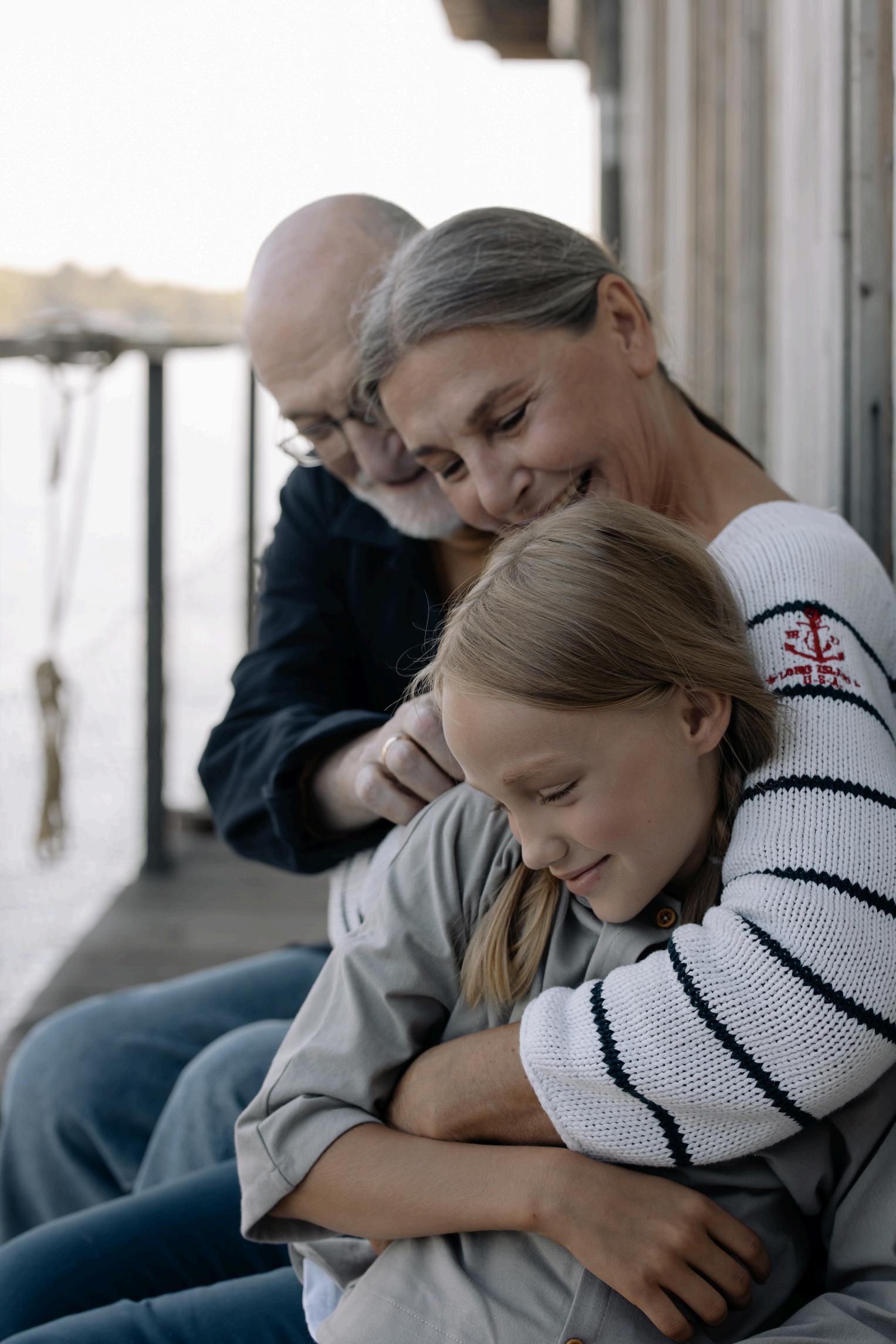
This document has multiple purposes. It is used by the agency decision-maker to reach their decision if the child ‘should be placed for adoption’. It also meets the requirements of Practice Direction 14C Annex B report for court, where there is an application for a placement order. The CPR provides information for prospective adopters throughout the matching process and panel It is a source of information for the child and will be shared with an adopted person returning to gain access to their records.
This new version has been updated to enhance the voice of the child, and features a number of important changes, including: the use of language in relation to the child’s identity and birth parent/s, how staying in touch plans are set out, and a greater focus on the identity needs of the child overall. There is a section asking the author to describe specific examples of spending time with the child to bring the child’s voice and experiences to life. The recently published AFDiT framework (by Dr Tam Cane) is embedded in the document. This supports decisionmaking in transitioning children from minoritised racial and ethnic groups into transracial adoptive families and helping practitioners to consider aspects of a child’s culture, race and identity.
This revised version will be launched in late March, alongside briefing sessions that provide an overview of the form’s structure, objectives and suggestions for completing a Child Permanence Report.
Book your place at a briefing session
Child Permanence Report (CPR) England: Briefing session - 2 April
Child Permanence Report (CPR) England: Briefing session - 3 April
Child Permanence Report (CPR) England: Briefing session - 7 May
Child Permanence Report (CPR) England: Briefing session - 8 May
The Prospective Foster Carer Report captures the work that has been done with prospective carers to prepare them for the task of fostering. It is also used to convey the key aspects in relation to the applicants and their family to the fostering panel.
The form has undergone a substantial revision. We have taken into account feedback from practitioners and foster carers. The updates include a change in language and tone to make this more accessible to carers and assessors. There is a new section about children’s needs and how the prospective carers will be able to meet these, which is an exciting development.
The revision will be launched in late spring, and we will also be hosting briefing sessions for this form. Sign up to our Training and Events newsletter to be the first to know when you can book your place!
The Child Health Suite of Forms includes the Initial Health Assessment (IHA), Review Health Assessment (RHA), and all forms that sit alongside these (including forms on parental health and the carer questionnaire).
The IHA and RHA have been divided into age groups for children aged 0-5, 6-10 and 11+ There is a separate form for unaccompanied asylum-seeking children (UASC), and children with additional needs or special educational needs. The changes introduce simpler and more childfriendly language (an appointment rather than an assessment), and consent sections are included as part of the referral form. The health plan has been enhanced, and we are introducing a separate health history section as suggested by NICE guidelines
We intend to publish these in early summer, although this is dependent on the completion of work external to CoramBAAF that impacts the forms. We will ensure that members and licence holders are updated about the new forms via email and our website.
Our updated forms will be published with new accompanying guidance about how to complete them. Upon the release of each new form, we are running free briefings for you to find out more about what has changed and what has stayed the same.
We are also in the process of updating our courses These will be available to book via the open programme on our website, or as a course commissioned specifically for your organisation. Where appropriate, we will also be developing versions of our updated forms in Scotland, Wales and Northern Ireland. This work will be undertaken in partnership with agencies and organisations in those nations.
We know that this work is important for our members and licence holders, as well as to us at CoramBAAF, and we are looking forward to sharing our forms with you over the coming year.

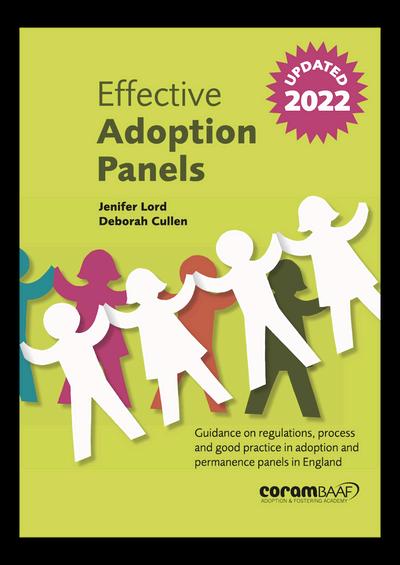
Authors
Jenifer Lord, Deborah Cullen, revised by Elaine Dibben
Price
£19.95

What are the roles and responsibilities of adoption panel members? What laws and regulations determine the functioning of an adoption panel? How can panels improve their work to make better placements?
‘Effective Adoption Panels’ answers these and many other questions. It is the only guide designed to help panels make sound and effective recommendations.
It also contains comprehensive appendices covering useful supplementary information such as sample job and person specifications and sample review formats This edition reflects all recent changes in regulations, standards and guidance.
This edition is fully revised and updated to take into account virtual panels, how best to integrate virtual panel work with the day-to-day work of the agency, developments in RAAs, developments in early permanence, and legislative and case law changes.
New and existing central list and panel members and all those who come into contact with the work of panels, particularly social workers, agency managers, committee members, adoptive parents and foster carers, and a wide range of other professionals.

Morning
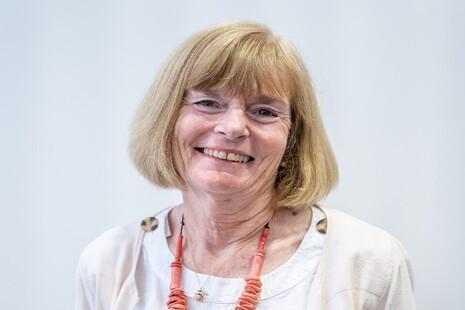
Jenny Coles CBE Panel member
10.10am - 10.30am | Main room
We are delighted to welcome Jenny Coles CBE as keynote. Jenny’s perspective incorporates a wealth of experience from across children’s services. This keynote address is an opportunity for attendees to consider her reflections on collective decision-making in both leadership roles and at panel. We are particularly excited to hear her views on effective panel functioning and evidence-based questioning from her experience as a panel member on the Child Safeguarding Practice Review Panel.
Jenny joined the Child Safeguarding Practice Review Panel in December 2021. A qualified social worker, Jenny has been a senior manager in local authority children’s services since 1997. She has vast experience in children's safeguarding, looked-after children, and quality assurance, and has also managed integrated youth services, youth justice, education, and special educational needs and disability services.
Jenny served as the Director of Children’s Services at Hertfordshire County Council from 2010 until her retirement in August 2021. She also held the role of President of the Association of Directors of Children’s Services from April 2020 to April 2021.
Relevant resources
Child Safeguarding Practice Review Panel - GOV.UK
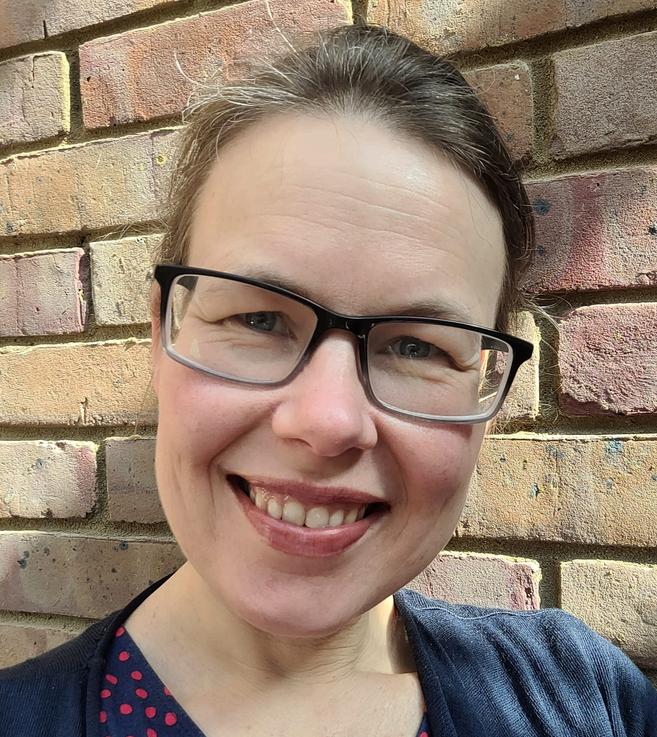
Linda Briheim-Crookall
Head of Policy and Practice Development, CoramVoice
10.35am - 10.55am | Main room
At the heart of panel, is a child or young person looking for a secure, stable and loving home. However, it can be easy to lose sight of that child or young person over the course of a panel as increasingly complex considerations build up. In this presentation, we will be finding out what children and young people say is important to them and their wellbeing Our speaker is Linda Briheim Crookall, Coram Voice, who will be sharing evidence and findings from a range of programs that collect and consider the views of care-experienced children and young people.
Linda leads the Voices Improving Care team at Coram Voice, overseeing programmes aimed at improving care by actively listening to and involving care-experienced children and young people. With over 20 years ’ experience in research, youth engagement and policy development, she has co-authored a range of publications. Linda shares that the best part of her role is helping others recognise that children in care and care leavers are experts in their own experiences, and that care improves when they are given a platform and the opportunity to shape it.
Relevant resources
Bright Spots Programme - Coram Voice
The door is still closed report - Coram Voice
·Disability, disparity and demand - Coram Voice
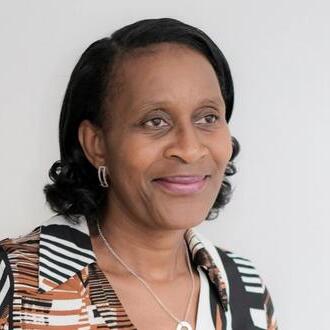
Arlene
Dr Arlene P Weekes, Author, Anti-Black Racism Activist, Social Work Management
Consultant and Trainer, PGCHE SFHEA
11.30am - 11.50am | Main room
This presentation explores the pivotal role of the Chair in facilitating effective panel discussions by harnessing personal judgement to encourage curiosity and professional impact. It examines the distinction between conscious judgment, bias and prejudice, highlighting the complexities involved in managing diverse perspectives and biases Using the author’s research, the presentation will explore the recommendations on how Chairs can refine their facilitation skills, minimise biases, and nurture an environment of open dialogue, ultimately enhancing the effectiveness and depth of professional panel discussions.
About Dr Arlene P Weekes
With over 30 years in social work, Arlene has held a variety of roles, including Probation Officer, Leaving Care Team Manager, Child Protection Chair, Fostering and Adoption Panel Chair, and IRO for foster carers and children. Currently, she balances her time as a freelance trainer, Service Manager, and senior lecturer at the University of West London. Arlene holds a PhD in social work, a Diploma in Management Studies, and a Practice Teacher Award Her PhD research, completed in 2021, examined how personal biographies, attitudes and values influence decision-making in social work. Building on this, she developed the Effective Personal and Professional Judgement (EPPJ) model, which helps individuals improve decisionmaking by understanding both internal and external influences.
Relevant resources
EPPJ | Increased Personal Awareness Increases Professional Effectiveness
What’s race got to do with it? BASW
Effective Personal and Professional Judgement in Social Work





Following our break at 11.30 am, our morning presenters will reconvene for our panel, along with some new guests.
Scan the QR codes (displayed in the venue) to submit your questions via mentimeter. These questions will be reviewed by our consultants and put forward to the morning panel at 12pm.
11.55am - 12.35pm
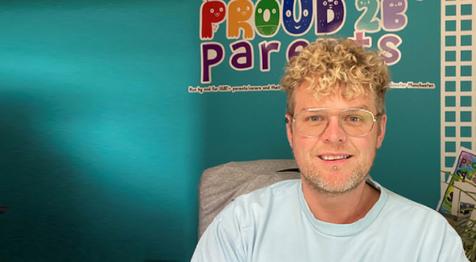
Matt Taylor-Roberts
Managing Director and Founder, Proud 2 b Parents
Proud 2 b Parents is an award-winning organisation supporting LGBT+ parents/carers, and their children. Matt also serves as an Independent Panel Member for multiple regional adoption
agencies and foster care panels. He represents LGBT+ parents and carers on the Health Partnership Forum and offers lived experience insights as a consultant for the DfE’s Adoption Reference Group and National Adoption Recruitment Strategy Equity Board. As a parent through adoption and foster carer, Matt brings invaluable personal insight to his professional work, enriching his advocacy for LGBT+ families.
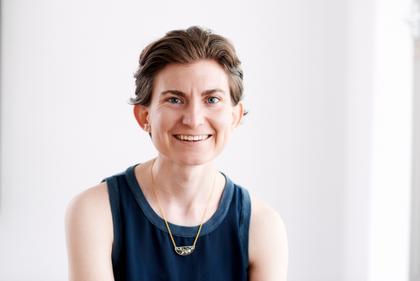
ociate
Director,
Centre for Evidence and Implementation
Ellie has led research aimed at improving the lives of children and families facing adversity across academia, government, and nonprofit sectors. She specialises in evidence synthesis,
systematic reviews, mixed-methods research, and impact evaluations. She has led research including on foster carer retention and recruitment, matching in foster care, supports for kinship carers, a 3-year evaluation of the Mockingbird programme, and an evaluation of Fostering Connections Ellie and her spouse have been fostering for a decade

Sharon McPherson Director of Co-production, Development and Policy, Families in Harmony
Sharon McPherson is an experienced Diversity and Inclusion consultant with 20 years of lived experience as a kinship carer.
Sharon has been instrumental in creating real change through social activism and in her career working with organisations including the Maternal Mental Health Alliance, Kinship, and Safer London. In recognition of her contribution to peer support in kinship care during the pandemic, Sharon received a Mayor’s award and continues to explore the paradigms of inclusion and diversity for black carers by undertaking her PhD research in kinship care.
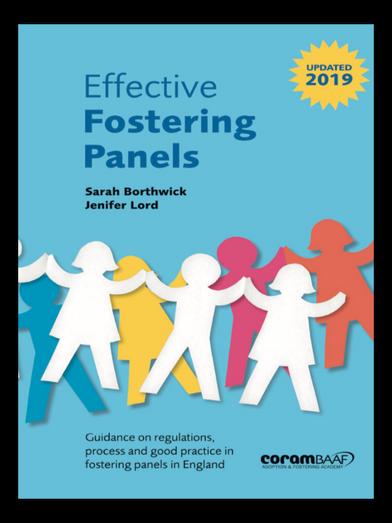
Authors
Sarah Borthwick and Jenifer
Lord Price
£19.95

Fostering panels have a crucial role to play in the provision and monitoring of foster care for looked after children and foster families. Members of fostering panels need up-to-date information and advice in order to carry out their duties effectively and responsibly. This guide brings together the key messages in regulations, standards and inspections about fostering panels. It offers good practice points to agencies in the operation of effective panels and is relevant to all fostering service providers Although the fostering regulations apply in England only, agencies in Wales, Scotland and Northern Ireland should find many of the practice points applicable.
Members of fostering panels, as well as foster carers, managers and workers in fostering agencies.
The guide explores:
How to establish a fostering panel
Agency policy and practice
The children requiring foster care
Considering the approval of foster carers
Family and friends as foster carers
Reviews, changes and terminations of approval
Monitoring and quality assurance.

Workshops are an opportunity for delegates to break into smaller groups to reflect and learn together. Workshops will begin at 1.35pm, and then repeat at 2.25pm.
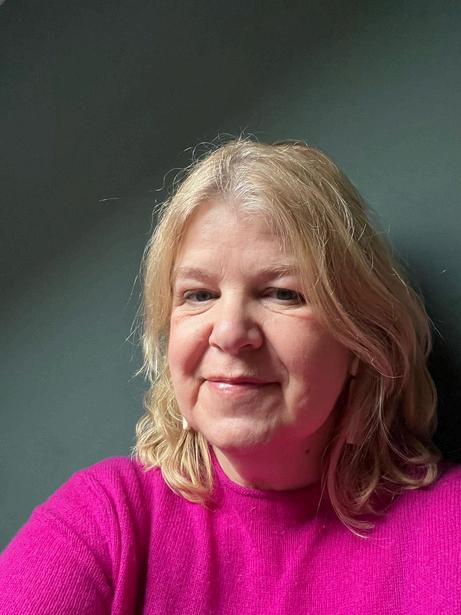
Jane Poore
Adoption Consultant, CoramBAAF
Children placed through early permanence may have been living with their family for a number of months, sometimes years, before they come to panel for matching. As a result, the matching panel process can sometimes feel like a ‘rubber stamping’ exercise.
Led by Jane Poore, Adoption Consultant, the workshop will look at the role of panel when child and carers have already developed a significant relationship. Also considering basics of Early Permanence, the workshop will consider how to openly and supportively explore what has happened, and what might need to happen, to ensure the family can meet the child’s needs through to adulthood.
Jane joined CoramBAAF in 2021 as a qualified Social Worker and has 20 years ' experience in fostering and adoption, assessing, matching and supporting adopters, alongside training prospective adopters. Jane has experience in working for both LAs and VAAs and was involved in the development of the Regional Adoption Agencies in the South West.
Prior to joining CoramBAAF, she was Agency Adviser in a large local authority for both fostering and adoption panels, as well as co-ordinating agency decisions for children. Jane also has a research background, and has worked on projects looking at reasons for adoption breakdown and long-term fostering placement endings.

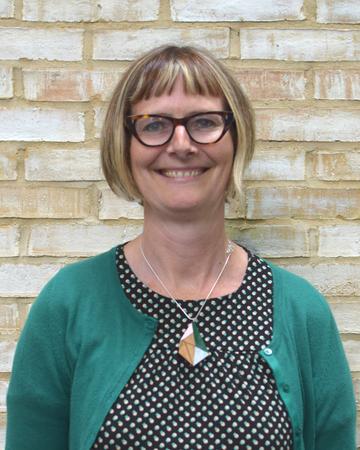
Clare Seth
Kinship Consultant, CoramBAAF
Ann Horne
Kinship Consultant, CoramBAAF

Led by Ann Horne and Clare Seth, Kinship Consultants, Interpreting Fostering National Minimum Standards in the kinship context focuses on how we can think about what the NMS mean when we are seeking approval and supervising and supporting kinship foster carers
Drawing on key messages and statements in the recently published Kinship Care Statutory Guidance Oct 24, as well as learning and experiences from members’ feedback, they will enable discussion and problem-solving around some of the challenges and dilemmas panel face when approving and supporting kinship foster carers. There will be particular focus on some of the Standards commonly cited as reasons for not recommending kinship foster carers.
About Ann Horne
Ann was a local authority social worker and manager in children's services for 20 years before joining CoramBAAF in 2022. She has worked in kinship care for the last 17 years, and for seven of these co-managed a dedicated kinship care team in Brighton & Hove.
Ann took a lead in developing comprehensive kinship support services, ensuring that kinship carers in Brighton & Hove were well served by a range of available supports.
About Clare Seth
Clare is a qualified social worker with over 25 years ’ experience in children’s services. She has managed a children’s social work team in Brighton & Hove, helping to implement a new relationship-based practice model as well as previously having responsibility for staff in fostering and fostering support teams.
Since joining CoramBAAF in 2022, Clare has continued to practice as a freelance social worker, mainly in kinship assessment and support.

James Bury
Head of Policy, Research and Development, Interim Managing Director, CoramBAAF
Emma Fincham
Fostering Consultant, CoramBAAF
Learning from lived experience of fostering panels provides an opportunity to walk in the shoes of an applicant or an approved foster carer. Panels by their nature are required to provide a formal, rigorous and balanced process; however, frequently the experience for those people attending panel is intimidating, confusing and judgemental. This workshop draws on the lived experiences of people who have attended panel Participants will be guided to consider and discuss reflections and suggestions on how panels can maintain their gravitas whilst simultaneously drawing out the best of prospective foster carers and approved foster carers in a sensitive and respectful way.
About Emma Fincham
Emma is a qualified social worker, with over 25 years of experience in children and young people’s services. Emma led on step down placements, for children and young people moving from a residential setting back to living with a foster family.
Emma has also worked in child protection, on establishing the young carers project in Tower Hamlets, co-ordinating the Summer University for young people in Brent, and on a service redesign for local authority and voluntary youth services in Brighton & Hove.
About James Bury
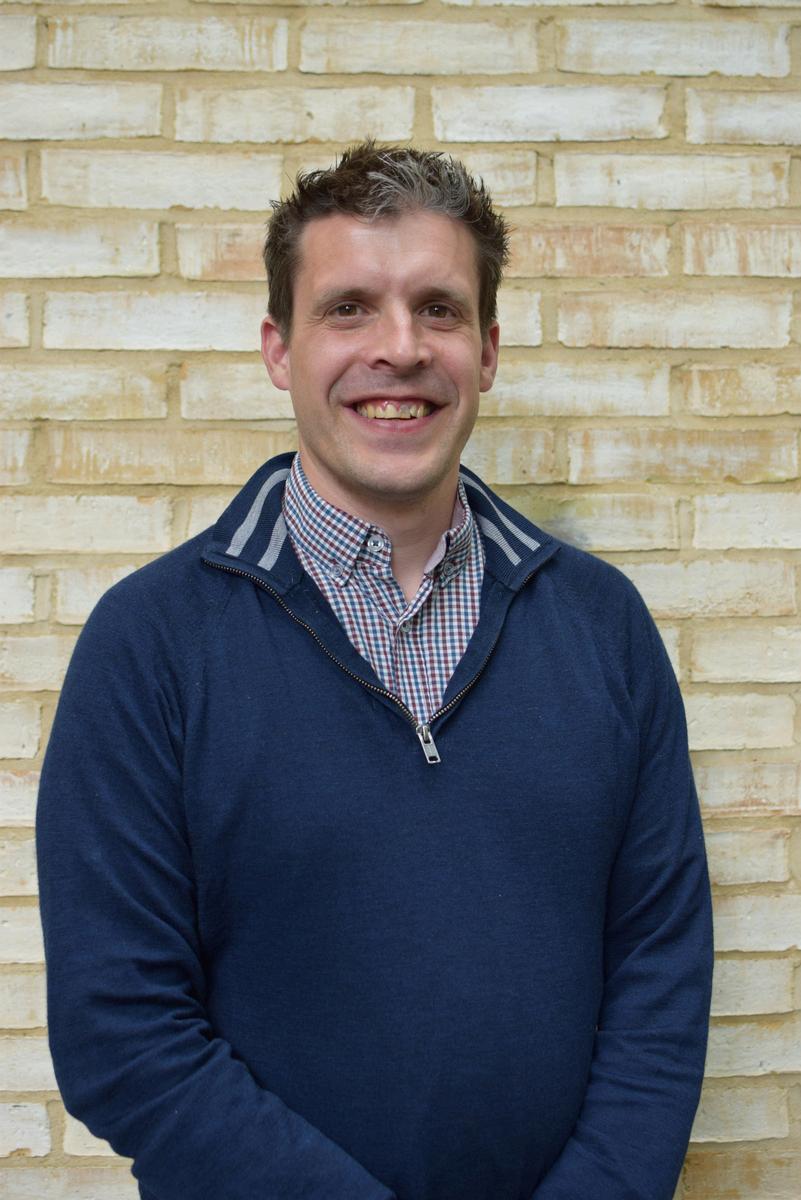
James has over 7 years ’ experience working directly with children He has worked as a Children’s Guardian and Family Court Adviser at CAFCASS and as a social worker in London and Norfolk operating in a safeguarding role.
Prior to becoming a social worker, James worked in public affairs for The Children’s Society and NSPCC, and as a researcher in Parliament. He brings a mixture of practice, policy and influencing skills in the children’s sector to CoramBAAF.

Legal Consultant, CoramBAAF
Legal
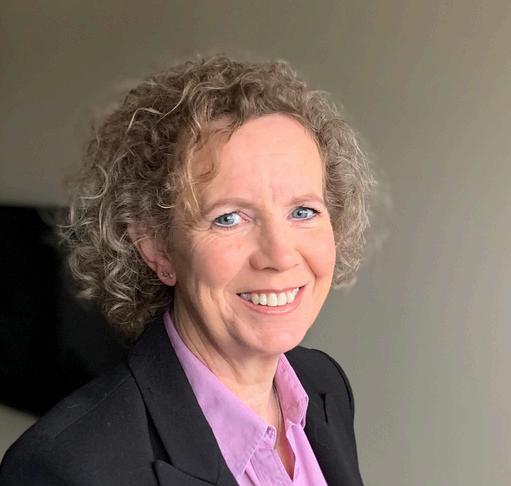
This interactive workshop will examine recent case law developments relevant to adoption, kinship and fostering. We will consider how panels can best engage in informed, child-centred and identity-focused decision-making when assessing proposed carers ’ ability to meet the permanence needs of a child. The session will address key legal principles, practical implications, and challenges in securing the best permanence outcomes for children. Participants will have the opportunity to reflect on recent case law developments, share perspectives, and enhance their confidence in applying case law to panel discussions.
Augusta qualified as a solicitor in 2020 and has extensive experience in youth justice, community care, education, and strategic litigation. Before joining CoramBAAF, she worked as a Youth Justice Lawyer and Policy Officer at Just for Kids Law. She also served as Head of the Children’s Rights Advice Service at Article 39. In 2023, Augusta was awarded a Churchill Fellowship, to research supported access to children’s social care files In 2024, she became the Chair of the Racial Justice Family Network, a collaborative initiative promoting anti-racist practice in the family justice system.
Alexandra was called to the Bar in 1989, and spent nine years in private practice, representing children, families and local authorities, followed by nine years as a Senior Child Care Lawyer in a London local authority. Her CoramBAAF role involves writing, advising and training on all aspects of the adoption and fostering process, as well as advising the IRM Cymru. Until recently, she combined her parttime role at CoramBAAF with employment as a child care lawyer in a North-East local authority, and now maintains hands-on experience with some private practice at the Bar.




Join our open course
1 May
9.45am - 12pm
Online via Zoom
This two hour training is aimed at local authority professionals – both social workers and lawyerswho are involved in the placement of children currently living in the UK to kinship carers overseas on a special guardianship order. It will provide an overview of the legal and practice issues regarding special guardianship for children being placed abroad. There will then be ample time to discuss issues in overseas cases during the case study and group discussion.
To have an understanding of the legal framework and eligibility considerations in special guardianship overseas
To be aware of the common issues that can arise
corambaaf.org.uk/resources/ outbound-permanenceservice
To have a wider understanding of practice issues relating to viability, assessment and support in an overseas context

We are the UK’s leading membership organisation for professionals working across adoption, fostering and kinship care. We provide information, best practice guidance, advice, training and resources to support our members and influence policy to improve outcomes for children and young people.
Our corporate members in England, Wales, Scotland and Northern Ireland represent 94% of all local authorities as well as regional adoption agencies, health and social care trusts, independent fostering providers and voluntary adoption agencies, and cover 88% of all children and family social workers.
Our 650+ individual and associate members - comprising lawyers, health professionals, educational institutions, therapeutic and family support services, and more - reflect the multidisciplinary nature of our work.
Together, our members make up the largest network of organisations and individuals involved with children in their journey through the care system.
We are a publisher
We provide the largest selection of books for social workers and children’s social care professionals. Our comprehensive range of publications offer up to date practice guidance and advice. We also publish the only quarterly peer-reviewed journal dedicated to adoption and fostering issues,
Adoption & Fostering Journal
We are a training provider

We are an advice and information service
Our Advice Line service responds to over 200 queries every month We provide expert practice advice, with input from our team of specialist consultants, to support the work of our members. Our information service keeps our members up to date with the latest news and developments. The monthly CoramBAAF Digest gathers together information on UK legislation, policy, research, statistics and online resources for those working in adoption, fostering, kinship and child welfare
We are Coram
We are part of the Coram Group. Our work enables us to better understand what works for children and young people, and communicate with those in a position to make a real difference We use our insight and experience to engage with government, local authorities, social workers, teachers, carers and families to help deliver better practice, systems and laws.


94% of local authorities are members, is yours?
Take advantage of your organisation's membership by creating a personal website account. This will grant you free access to a range of membership benefits, including webinar recordings, access to our journal, and much more.


